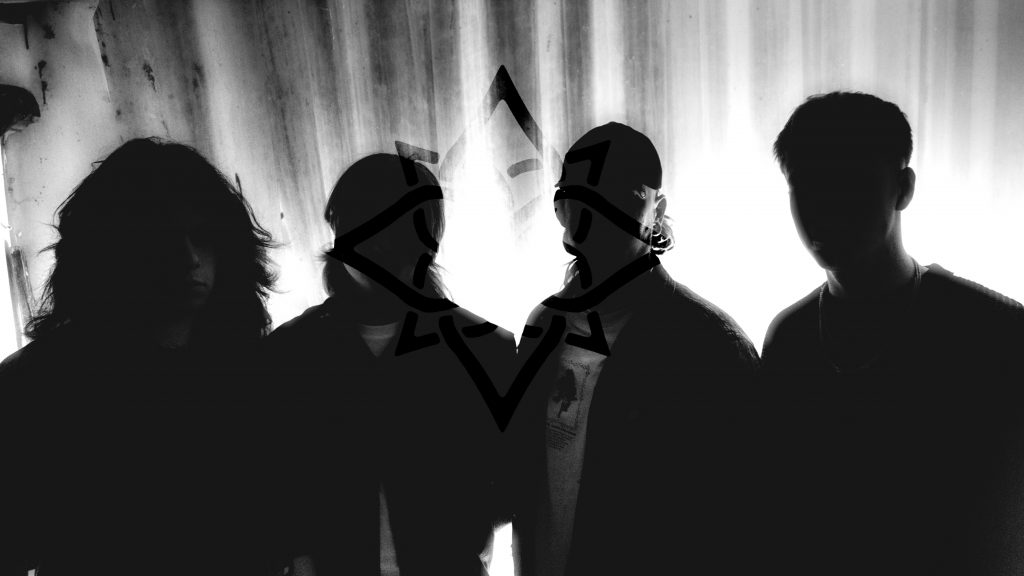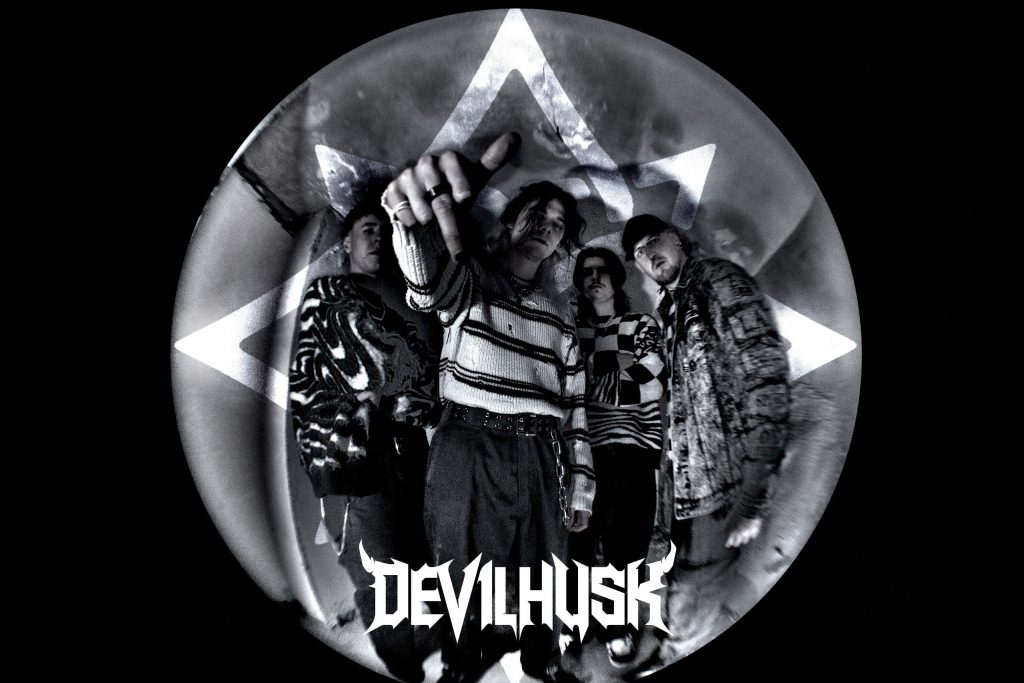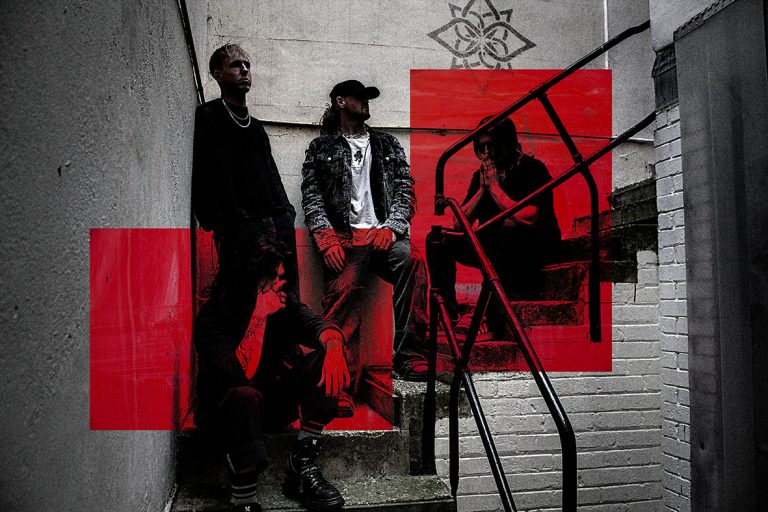We spoke with Metal 2 The Masses, Brighton, winners Devilhusk, prior to their debut set at Bloodstock’s New Blood Stage to discuss the competition, what they hope appearing at Catton Hall does for them, and how they manage to coalesce some disparate genres into the coherent brutality that makes up their sound.
I wanted to start off by saying congratulations as winners of Metal 2 The Masses, Brighton! Can you tell us what your mindset was going into that night and when you won?
Joe: We never entered the competition with the idea that we would win. We sort of had, but we started playing together in February. Started playing this year, so sort of the opportunity to get involved in the local scene, play some shows, see how far we get. That was all we were intending when we entered. So, getting to the final, it was sort of like every time we were like, “We are just lucky to be here – let’s just get through the gig”. Hopefully, we just made the people in the scene enjoy it, and whatever happens, we don’t care beyond that. Having our name called out at the end, it’s a surreal experience, like, “Oh, really? Over Monovoid? And everyone else?”
Kino: Monovoid are sick! Everyone should listen to Monovoid.
Joe: They’re Brighton guys. Proggy, weird, out-there! Right up all of our streets.
Kino: We kind of knew we’d get a Brighton gig, and if we won, we’d get another Brighton gig. It was kind of just a way to, you know, build up the loop for the following. And by the final, we had people coming there to see us wearing our T-shirts. So, it was like, “Okay, well, we did what we wanted to do anyway!”
Joe: We achieved the goal!
How did that feel in getting to the final and having people wearing your T-shirts?
Kino: It’s cool! So, we weren’t just wasting our time – this is an actually valid musical vision. Cool, awesome. It’s very self-affirming.
You say that you started gigging around about February, so a quick turnaround in terms of having merch out and then having people show up to the final, willing for you guys to win. How does that make you feel?
Kino: Like I say, it’s self-affirming. But we spent a lot of time in the lab cooking, trying to make sure that when we did start gigging, everything was ready, so we didn’t spend time fumbling or like, “Oh, maybe we should do this…” We had a clear, set idea of, “Okay, we’re going to do this and that”. It means that things like getting shows and selling T-shirts have been faster than if we hadn’t done that.
Joe: My initial thought when they called our name was that we had just sold out of T-shirts – “Now we’ve got to order more! Oh, no, what are we gonna do?” It was nice to know what we were doing and the idea, because our music is really electronic influenced. It’s basically dubstep with guitars and shouting. We weren’t sure if metal crowds were going to gel with it, and most electronic crowds probably wouldn’t gel with it, either. So, it was a bit concerning to put all the work we put in beforehand. But coming to the final, getting that far and winning was like, “Oh, it does work!”. Yeah, this is cool. It’s so nice to be here, and we got an article written before we came. It was Noizze who put out an article of twenty must-see bands at Bloodstock, and we were on it with bands like Paleface, Swiss. We were like, “Our name is on that thing!” We feel lucky to have that.
Kino: We never went in with the concept of like, “Oh, we have to do everything we can to win”. It was just like, “Yeah, we’re gonna play some sick shows”. So, getting this far means we get to play more sick shows!

Again, congratulations, as clearly, your hard work has paid off! You briefly touched on it there, but going into that final, what was your preparation like? Did you do anything different at some of the gigs that you had been doing previously, or was the mindset “this is the final, we need to do something more”?
Kino: We had been told bits by other bands, whereas you kind of need to have a thing for winning Metal 2 The Masses finals. “Shit, well, what’s our thing?” We made crowd interaction a bit more of a focus, and you put in a bit more of a shift.
Joe: Because I’m a fumbler of my words all the time and looking down at a setlist in front of me with notes, and that’s all a bit hard on a sweaty stage. So now I’ve got a cue in my ear that tells me when to shut up between songs. It’s just like, “You’re talking too much. You can shut up now”. What’s the next song? There’s no setlist on stage – I’m all over the shop when I’m on stage. I might not be where the setlist is when I’m doing something, so that made life a bit easier, which meant I knew with confidence that I could just spew my heart out, get people involved, and then my own voice is in my ear saying, “Right, wrap-it up now!” So, it’s like that was the thing we added in for the final to help boost crowd interaction, so I could get involved a little bit more and be less “I don’t know how long until the next break…” Sorry to pull back the mystery curtain!
Interesting insight into you guys and how you function as a band.
Kino: Yeah, we do things very neurotically. Everything has to be done beforehand so we can go in not being nervous as shit!
I get that – that’s why I have a page full of notes! So, you talked about the competition earlier, and you talked about your reaction – you’ve also talked about how you see being here as helping the band to play more shows. But beyond that, what do you see playing at Bloodstock having won Metal 2 The Masses, playing the New Blood will do for you?
Joe: It’s a steppingstone in the way that this is a massive opportunity. There are bands every year that get this opportunity, and we don’t want to waste them by not putting our heart and soul into it and doing exactly what we’ve been doing. Being prepared, getting everything ready in advance – we’re working with six months to a year’s worth of material, waiting, trickling releases to keep people interested. It’s trying to keep people’s minds because it’s so quick with streaming and stuff like that.
Kino: Yeah, you see something and then thirty seconds later you have forgotten about it.
Joe: It’s gone. So, we want to use this opportunity like Dead Flesh have just done, where they did Metal 2 The Masses last year, won, played New Blood, and they just opened up the Sophie Stage. I’ve seen that band so many times when we played with them or where it was back home – I’m from Hertfordshire originally – seeing them play there or in their previous bands where they were all in, and that was the best thing I’ve ever seen. So, if anyone missed that, that’s on you. Anyone who didn’t come and see that – it’s your mistake.
Kino: They have kind of proved for us that, yeah, it could be done. Because it doesn’t happen for every band, they play New Blood, and it helps, but it’s only a momentary boost. They don’t really keep it consistent. Dead Flesh did New Blood, and they’re using it as a ramp. It’s working, so it can be done. You just have to do the same thing.
Joe: So, we’ve decided we’re camping with them this year to just pick their brains. So, really, like, “What did you do, guys, what did you do?”
What’s your secret sauce?
Kino: Yeah, apparently, they don’t even know. I think they are just good. I think that’s what it is.
Joe: We just need to get good, yeah.
You talked about the different types of genres that make up the sound of Devilhusk. So, I wanted to ask, what was the inspiration behind that, and when you are writing a new track, how do you combine them all and make sure that they all make the sum of their parts?
Kino: That’s a very good question, because the combination and amalgamation of everything is something that I’ve been fucking fighting myself over the entire time I have been doing it. Because I very deeply love dubstep. I very deeply love drum and bass. I kind of came up doing that – that’s how I learned to produce, how I learned to use all the software, by doing that. That’s kind of where I grew up as a producer or whatever. But writing-wise I’ve always written metal music. I play guitar and it’s like, “Okay, well, I’ve got these two skill sets that don’t really mesh that well” and forcing them to mesh has kind of been the task, but I think we’ve kind of gotten the hang of it, or I’ve gotten to a point where I’m comfortable having all these things going at once and it doesn’t sound like a mess. It sounds cohesive. It sounds like they’re supposed to be there. That is the point of the music as opposed to “Oh, they’re just doing a gimmick”. The sound design and the way that it’s structured is just as much a part of it as the guitars are or his vocals are. So, it’s been a journey, but we’ve kind of gotten to a point where we are comfy with it.
Joe: It’s not breakdown music with a synth over the top. The synth is an integral part of what makes it…
Kino: Sound the way it does.
Everything is there for a reason – it’s not just chucked into it. You talked about how you will plan everything. So how do you find and ensure that your music and the amalgamation of sounds that you’ve got translates well live?
Kino: Yeah, it’s one thing to have something sound good in headphones at home and then making it sound good live is a whole different story. It’s a difficult question to answer because we’ve kind of just winged it and hoped for the best, and it kind of does translate live. Not to s*** on any venues without good systems, but a lot of our music is very sub-heavy, it’s got a lot of sub in it, it’s got a lot of low-end, and if they’ve got a good low-end system, we’re going to be all right. We can generally make things translate. We’ve put in efforts to try and balance things out when we’ve done rehearsals, and we’re running through PAs. We have remixed stuff, so the levelling and mixing that we have live is absolutely not the same as on track. If it was the same as it is on track it would sound like shit. But yeah, making that work, it’s definitely something we’re still actively working towards perfecting. But I think we’ve got to a pretty decent middle ground so far.
Looking ahead, what’s next for you guys, what’s happening in the next few months?
Kino: Got a single, ‘Vitriol’. It’s on the debut EP that’s coming up. EP release by the end of the year, and then more gigs.
Joe: There are some more shows later on in the year, just scattered about. We’re looking for a few more.
Kino: Yeah, we want to thicken up the amount of stuff we’re doing. Put stuff in between what we’re already doing, just make it so we’re constantly busy, and we hate ourselves.
Amazing – one more. What’s 2026 going to hold for you guys?
Kino: More music, bigger stages, more batshit insane ideas!
Joe: More! More of everything, because we want the dial up at 11, and keep turning until it snaps off.
Thank you again for speaking to us – last question – is there anything that you’d like to say to your fans or to the Devolution readers?
Kino: You’re the goats! That’s why you’re the goat!
Joe: That’s why you’re the goat. Now go and eat a brick
Kino: Yeah, eat bricks, that’s good for the brand!
https://www.facebook.com/DEVILHUSK080
Interview By Lee Carter
Photos Below By DEAD.EYE.MEDIA



